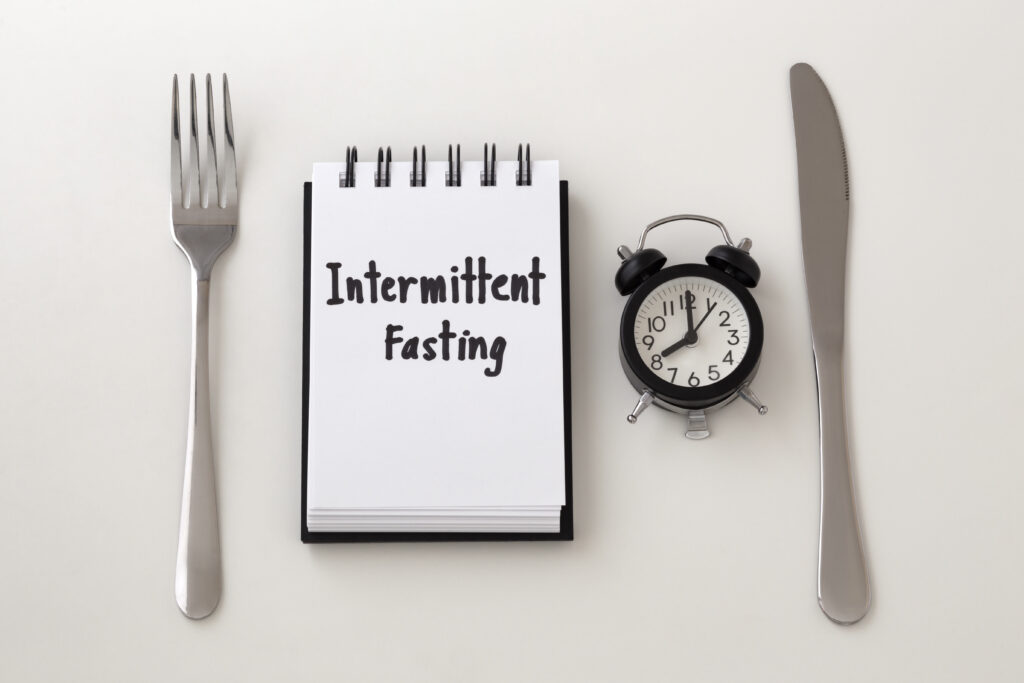How does it work ? Are there different ways of practicing it? How does intermittent fasting work while in Ketosis?
Check out the below
Several studies have shown that intermittent fasting is an effective way to achieve weight loss and control Type 2 Diabetes (scientific study). Another study found that intermittent fasting prevents neurodegeneration, and delays the signs of aging.
What is Intermittent Fasting (IF)?
You should not confuse intermittent fasting with a diet, or a fad diet, because it is neither of those things. Instead, it is an alternative pattern of eating behavior. Let’s break this down:
- “Alternative”, because it questions the traditionally-accepted pattern of eating. Which is: breakfast, lunch, dinner (plus one or two snacks). We were always taught not to skip breakfast and to eat during these prescribed times. Intermittent fasting goes against this norm. It shows you a new way to schedule your meals so that your body and mind benefit the most.
- “Pattern”, because intermittent fasting focuses on the “when” of eating, as opposed to “what” you are eating.
How intermittent fasting works
The absorption state
After you eat, your body starts digesting and absorbing food. This process can last for up to 5 hours. During this stage, your insulin levels are high, hence it’s difficult for your body to burn fat.
Post-absorption (fasting) state
After those 5 hours, your body enters a stage where it isn’t processing or absorbing a meal. This can last between 8 hours to 12 hours. Your insulin levels will be low during this time; hence your body can easily burn fat.
This means that for your body to achieve fat burn, it has to be in the fasting state. You have to be in this 12-hour threshold. If you have ever wondered how some people can lose weight without changing what or how much they consume, or going into a crazy exercise regimen, this is how they do it.
How will intermittent fasting benefit you?
We have already mentioned some of the benefits you will experience by fasting intermittently. While it’s exciting to lose body fat and watch yourself transform into a leaner and healthier you, this is not the only benefit.
-
Live a longer life
It is a scientifically proven fact that restricting calories can lengthen your life. While we all want to live longer, the only problem is, we also want to enjoy life! Intermittent fasting triggers the same life-extension mechanisms that calorie restriction does.
-
Reduce the risk of diseases like cancer
There is still a lot of debate going on about this benefit, and extensive research still needs to be done. However, the little research that has been done shows that there is a strong correlation between fasting and cancer reduction.
One study shows that alternate fasting increases the cure rates of patients on chemotherapy. This publication also summarizes different studies into the subject of intermittent fasting and finds that they all point to the same benefit: cancer reduction and lower risk of cardiovascular disease.
-
It’s easy and doable
It is easy to stick to and adapt to a new way of eating than it is to change what we are eating. A study conducted on 16 people with obesity over a 10-week period concluded that the test subjects quickly adapted to alternate day modified fasting (ADMF), thereby achieving weight loss within that period.
Different schedules for intermittent fasting
§ Time-restricted feeding (Daily intermittent fasting)
Time-restricted feeding is also known as daily intermittent fasting. A good example is the Leangains Model. Martin Berkhan created the Leangains model, which proposes a fasting period of 16–hours, followed by an eating period of 8 hours. Choose eating times that will suit your day. For instance, if you want to eat with your family but need to put your kids to bed by 8pm, you can start your eating period at noon and stop at 8pm. If you usually get home late in the evening, start at 2pm or 3 pm and end at 10pm or 11pm.
§ Whole day fasting
Whole day fasting involves 24-hour calorie restriction for a day or two out of the week. With this schedule, you get to fast one day of the week. You will not cut a significant number of calories this way, but you will still reap the benefits of intermittent fasting.
Example: If you eat lunch at 1pm on Tuesday. With this model, your next meal will be at 1pm on Wednesday.
This is a great place to start if you have never done intermittent fasting before. It will help you to get attuned to the feeling of fasting, thereby increasing your chances of success in future.
§ Alternate Day Intermittent Fasting
As the name suggests, with this model, you will fast on alternate days of the week.
The downside is that, due to the intense calorie restriction, you will need to feast during your meals to make up for lost nutrition. This method is therefore not advisable for prolonged periods, as it can result in drastic weight loss and a lack of key nutrients.
Intermittent fasting and the ketogenic diet
The ketogenic diet is a high-fat, moderate protein, low-carb diet that has been shown to aid weight loss, control blood sugar, and treat or reduce the risk of several diseases such as xxx. The ketogenic diet reduces daily carb intake to below 50 grams (as low as 25 grams for some), making fat, instead of glucose, the primary energy source for your body. This metabolic state, where your body breaks down fat into ketones and uses them for energy instead of glucose, is called ketosis.
Committing to intermittent fasting while on the ketogenic diet has several benefits:
- It will help you reach ketosis faster.
- You will get over your weight loss plateau faster.
- You will burn more fat and preserve muscle mass, resulting in energy efficiency and better athletic performance.
Bottom line: Should you try intermittent fasting?
Absolutely! Intermittent fasting is considered safe unless you fall in the following categories:
- If you are pregnant or breast feeding, you should focus on getting more nutrition for you and your child. Note however that you should still feed on healthy food options.
- If you have a history of eating disorders, it is important to consult a doctor or dietitian to guide you through this process.
- If you have high blood pressure, diabetes, cancer, degenerative diseases or you are suffering from prolonged illness, consult a doctor before you start intermittent fasting.
As always, I’m available for consultation, to guide you to a healthier you.





Hi good morning
My name’s Maria Grazia
I’m 53 year old.
I would like to start the keto diet with alternative days.
Actually I need to lose 7kg because I’m protrusion problem L4 L5 .
The problem is I’m in menopause and i don’t lose zero kg. I’m know very well ketogenic diet and for my self I did. But 100% something I wrong.
Ther is some one speak Italian or Spanish? Because my English isn’t well.
Thks
Regards
Maria Grazia
Hi Maria Grazia, I do speak french if that helps